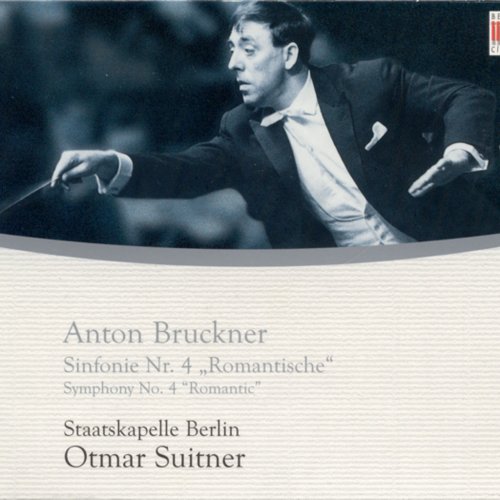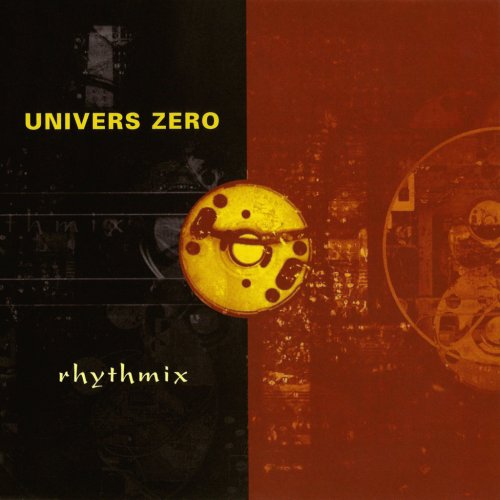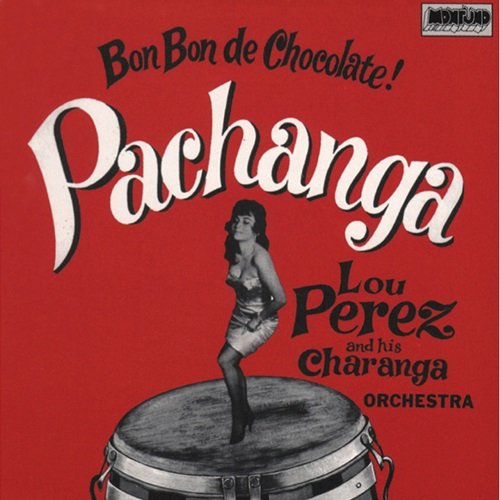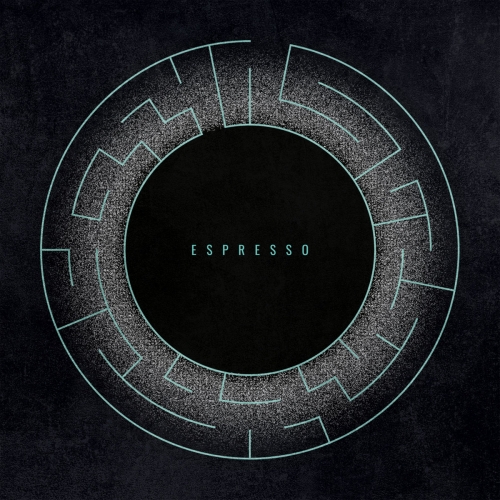Otmar Suitner, Staatskapelle Berlin - Bruckner: Symphony No. 4, "Romantic" (2009)

Artist: Otmar Suitner, Staatskapelle Berlin
Title: Bruckner: Symphony No. 4, "Romantic"
Year Of Release: 2009
Label: Berlin Classics
Genre: Classical
Quality: FLAC (tracks)
Total Time: 01:04:33
Total Size: 255 Mb
WebSite: Album Preview
Tracklist: Title: Bruckner: Symphony No. 4, "Romantic"
Year Of Release: 2009
Label: Berlin Classics
Genre: Classical
Quality: FLAC (tracks)
Total Time: 01:04:33
Total Size: 255 Mb
WebSite: Album Preview
Symphony No. 4 in E flat major, WAB 104, "Romantic" (Anton Bruckner)
1. I. Bewegt, nicht zu schnell 18:33
2. II. Andante quasi allegretto 15:38
3. III. Scherzo - Trio 10:39
4. IV. Finale: Bewegt, doch nicht zu schnell 19:43
Performers:
Staatskapelle Berlin
Otmar Suitner, conductor
The international career of Otmar Suitner (1922-2110) was at first somewhat restricted by his residence in the German Democratic Republic and his association with a more limited circle of artists. He did conduct in Bayreuth and as far afield as San Francisco and Tokyo, but his prolific discography of symphonic and operatic recordings is still not widely known, even to supposed cognoscenti.
A professorship in Vienna and the acquisition of an Austrian passport – he was born in the Tyrol - eventually permitted him to maintain a colourful and complicated personal life, with one wife and family in (the former East) Berlin and another partner and son in the Western sector. This arrangement endured for two decades until the Wall came down, when the two families were introduced and ultimately reconciled. I grant, however, that none of this is relevant to his musicianship beyond providing interesting background information - and perhaps being indicative of the man’s energy…
He was educated in the Kapellmeister tradition, first a conducting student of Clemens Krauss, then a répétiteur and a concert pianist, and became especially renowned for his interpretations in Mozart, Dvořák, the Austro-German Romantic and, perhaps as a result of having an Italian mother, even the Italian, repertoire; this studio recording from early 1989 confirms that he was specifically adept in Bruckner.
There is a grand unity of purpose about this recording, as if everyone involved knows exactly what this Bruckner symphony should sound like and no-one has time for fussing with details or point-making; with supreme assurance, it rolls on through four movements like a juggernaut. That is not to say that it in any sense bland, lazy or generalised - it’s simply that everything here is right. The recording acoustic is quite open and distanced, reflecting the recording venue and it is the sheer sonorousness of the orchestra which is most striking: a warm, golden sound ideally suited to Bruckner’s ever-expanding vistas. The brass is especially refulgent – what an orchestra this was then, no doubt nurtured by the injection of cash from the authorities eager to present and preserve a cultural superiority and further inspired according to that peculiarly Communist phenomenon whereby those oppressed by the drab greyness of a totalitarian regime escape into the kaleidoscopic nirvana of music-making.
There is nothing unusual about Suitner’s tempi but nor is he uniformly rigid; phrases breathe and rubato is subtly applied - this you can hear within just a few minutes after the famous horn-call entry and before the series of blazing chorales which punctuate the first movement and alternate with the hammered triplet theme. There is grandeur in the every utterance of that bank of brass but also tenderness in the answering strings and flutes. The Adagio unfolds entirely naturally; Suitner keeps a light hand on the tiller and lets his orchestra play softly, with Innigkeit before letting them surge then subside in the final bars. The Scherzo is identical in timing to Karajan’s recordings and similarly fluid and responsive. The finale is always a challenge; it must not degenerate into a ragbag of disconnected ideas but Suitner has its measure, cunningly grading dynamics and shaping long phrases to create a wonderful sense of tension and drama. The timpani are thunderously prominent throughout and the pace never flags; there is always a sense of the current section pointing forward towards the next. - Ralph Moore
A professorship in Vienna and the acquisition of an Austrian passport – he was born in the Tyrol - eventually permitted him to maintain a colourful and complicated personal life, with one wife and family in (the former East) Berlin and another partner and son in the Western sector. This arrangement endured for two decades until the Wall came down, when the two families were introduced and ultimately reconciled. I grant, however, that none of this is relevant to his musicianship beyond providing interesting background information - and perhaps being indicative of the man’s energy…
He was educated in the Kapellmeister tradition, first a conducting student of Clemens Krauss, then a répétiteur and a concert pianist, and became especially renowned for his interpretations in Mozart, Dvořák, the Austro-German Romantic and, perhaps as a result of having an Italian mother, even the Italian, repertoire; this studio recording from early 1989 confirms that he was specifically adept in Bruckner.
There is a grand unity of purpose about this recording, as if everyone involved knows exactly what this Bruckner symphony should sound like and no-one has time for fussing with details or point-making; with supreme assurance, it rolls on through four movements like a juggernaut. That is not to say that it in any sense bland, lazy or generalised - it’s simply that everything here is right. The recording acoustic is quite open and distanced, reflecting the recording venue and it is the sheer sonorousness of the orchestra which is most striking: a warm, golden sound ideally suited to Bruckner’s ever-expanding vistas. The brass is especially refulgent – what an orchestra this was then, no doubt nurtured by the injection of cash from the authorities eager to present and preserve a cultural superiority and further inspired according to that peculiarly Communist phenomenon whereby those oppressed by the drab greyness of a totalitarian regime escape into the kaleidoscopic nirvana of music-making.
There is nothing unusual about Suitner’s tempi but nor is he uniformly rigid; phrases breathe and rubato is subtly applied - this you can hear within just a few minutes after the famous horn-call entry and before the series of blazing chorales which punctuate the first movement and alternate with the hammered triplet theme. There is grandeur in the every utterance of that bank of brass but also tenderness in the answering strings and flutes. The Adagio unfolds entirely naturally; Suitner keeps a light hand on the tiller and lets his orchestra play softly, with Innigkeit before letting them surge then subside in the final bars. The Scherzo is identical in timing to Karajan’s recordings and similarly fluid and responsive. The finale is always a challenge; it must not degenerate into a ragbag of disconnected ideas but Suitner has its measure, cunningly grading dynamics and shaping long phrases to create a wonderful sense of tension and drama. The timpani are thunderously prominent throughout and the pace never flags; there is always a sense of the current section pointing forward towards the next. - Ralph Moore
![Andreas Røysum Ensemble - Andreas Røysum Ensemble with Marvin Tate (2025) [Hi-Res] Andreas Røysum Ensemble - Andreas Røysum Ensemble with Marvin Tate (2025) [Hi-Res]](https://img.israbox.com/img/2026-02/09/ykeodm7hf0rcmt815qdtlvyfd.jpg)
![Herbie Mann - East Coast Jazz / 4 (Remastered 2014) (2026) [Hi-Res] Herbie Mann - East Coast Jazz / 4 (Remastered 2014) (2026) [Hi-Res]](https://www.dibpic.com/uploads/posts/2026-02/1770799757_u38b9gzog0i62_600.jpg)
![Carmen McRae - Carmen McRae (Remastered 2014) (2026) [Hi-Res] Carmen McRae - Carmen McRae (Remastered 2014) (2026) [Hi-Res]](https://www.dibpic.com/uploads/posts/2026-02/1770854395_mhompkx1v4d7b_600.jpg)


![Bill Evans Trio - Sunday At The Village Vanguard (1961) [2023 DSD256] Bill Evans Trio - Sunday At The Village Vanguard (1961) [2023 DSD256]](https://www.dibpic.com/uploads/posts/2026-02/1770661877_front.jpg)
![Cheo Feliciano - The Singer (Remastered 2026) (2026) [Hi-Res] Cheo Feliciano - The Singer (Remastered 2026) (2026) [Hi-Res]](https://img.israbox.com/img/2026-02/12/ydkgf84okz76yo2jxrbeqc3b2.jpg)

![Robert Lucaciu - FALLEN CROONER (2026) [Hi-Res] Robert Lucaciu - FALLEN CROONER (2026) [Hi-Res]](https://www.dibpic.com/uploads/posts/2026-02/1770896672_rzrlbctp6z9sb_600.jpg)